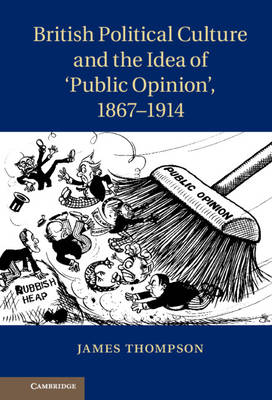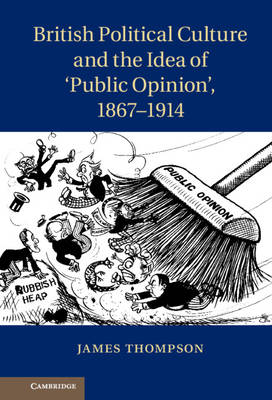
- Afhalen na 1 uur in een winkel met voorraad
- Gratis thuislevering in België vanaf € 30
- Ruim aanbod met 7 miljoen producten
- Afhalen na 1 uur in een winkel met voorraad
- Gratis thuislevering in België vanaf € 30
- Ruim aanbod met 7 miljoen producten
Zoeken
British Political Culture and the Idea of 'Public Opinion', 1867-1914
James Thompson
Hardcover | Engels
€ 194,95
+ 389 punten
Omschrijving
Newspapers, periodicals, pamphlets and books all reflect the ubiquity of 'public opinion' in political discourse in late nineteenth and early twentieth-century Britain. Through close attention to debates across the political spectrum, James Thompson charts the ways in which Britons sought to locate 'public opinion' in an era prior to polling. He shows that 'public opinion' was the principal term through which the link between the social and the political was interrogated, charted and contested and charts how the widespread conviction that the public was growing in power raised significant issues about the kind of polity emerging in Britain. He also examines how the early Labour party negotiated the language of 'public opinion' and sought to articulate Labour interests in relation to those of the public. In so doing he sheds important new light on the character of Britain's liberal political culture and on Labour's place in and relationship to that culture.
Specificaties
Betrokkenen
- Auteur(s):
- Uitgeverij:
Inhoud
- Aantal bladzijden:
- 299
- Taal:
- Engels
Eigenschappen
- Productcode (EAN):
- 9781107026797
- Verschijningsdatum:
- 28/10/2013
- Uitvoering:
- Hardcover
- Formaat:
- Genaaid
- Afmetingen:
- 150 mm x 231 mm
- Gewicht:
- 566 g

Alleen bij Standaard Boekhandel
+ 389 punten op je klantenkaart van Standaard Boekhandel
Beoordelingen
We publiceren alleen reviews die voldoen aan de voorwaarden voor reviews. Bekijk onze voorwaarden voor reviews.











